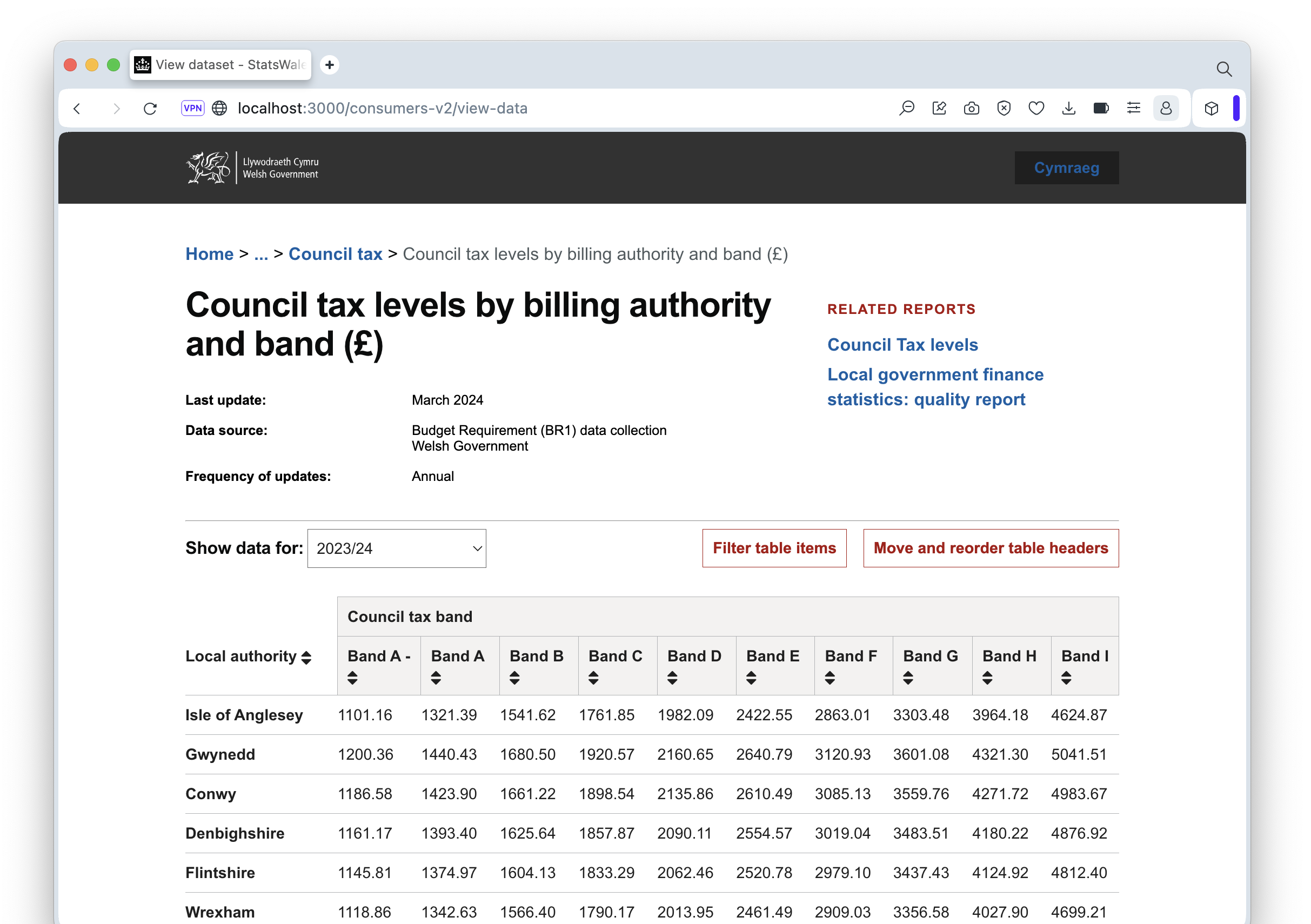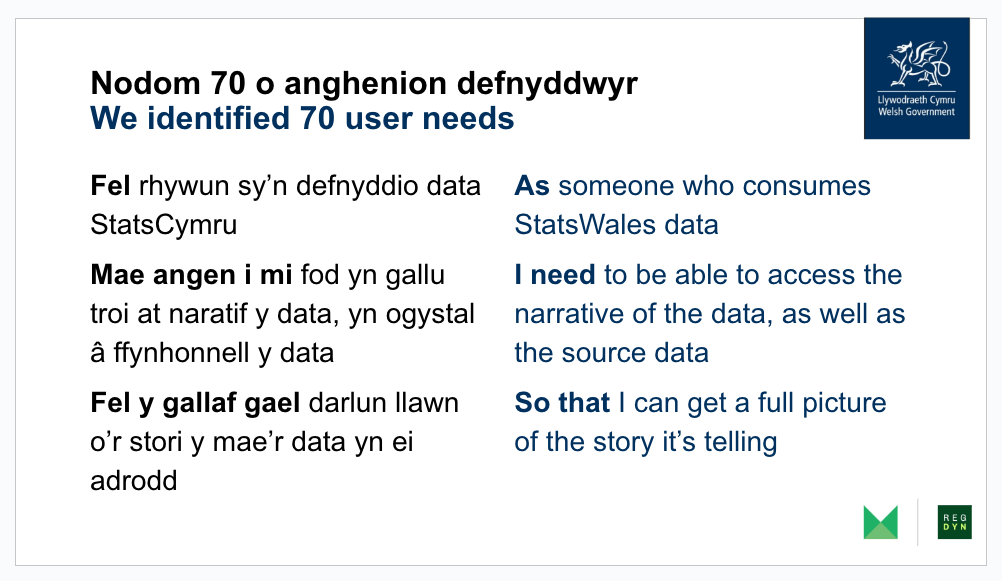Following our discovery which recommended that the Welsh Government replace their data publishing platform, we delivered an Alpha phase to explore a range of different options and make a recommendation on what they should build.
The Welsh Government’s Knowledge and Analytical Services (KAS) is the unit which provides expert advice and insight on a range of policy areas. They produce evidence-based research and analysis to inform decision-making. As a part of this work, they manage StatsWales, the official data publishing service for the Welsh Government. In late 2022, they asked us to conduct a discovery into their needs and requirements for replacing the service. We validated the need to replace the service and recommend a plan for delivery.
Following the discovery, KAS implemented our recommendation that they ‘should create a new service to make Welsh statistical data more easily available to help improve life in Wales’. While we had identified 70 user needs to be met by the new service, there are many different ways these goals could be achieved. We therefore also recommended that KAS run an Alpha phase. We therefore needed to explore the range of options available, identify the most promising solutions to test with users, and then validate which of those were the most promising outcomes to develop into Beta.
We initially identified our riskiest assumptions – which we wanted to prove or disprove in Alpha, to ensure we were travelling in the right direction. These initially included, could we develop a simple, intuitive and feasible means to:
We explored a range of different solutions to each of these challenges through a mixture of collaborative ideation workshops, functional prototypes and technical proof-of-concepts. The most promising approaches were validated through user testing across 3 rounds of testing with 18 real service users.
In addition, the team conducted a detailed analysis of the existing StatsWales data, understanding what constraints and limitations we needed to address through development, and with a particular eye on migrating the existing data to the new service.

While the project was delivered smoothly and on time, we had a number of challenges we faced, with Welsh Government colleagues along the way.
Because KAS have a legal obligation to publish their data in the open, it’s critical that we be able to both migrate all of the existing data and tables from the pervious service, while also ensuring continuity of service over thee transition to the new service. As such, we decided to refine the current data architecture, rather than redesigning it from scratch, meaning we could migrate safely and effectively. However, we could still introduce innovative new features, such as introducing service wide lookup tables for common data (e.g. dates, places, etc) to reduce effort and duplication, and increase consistency across data.
Another challenge was that the Welsh government aren’t quite as far ahead on their digital transformation as, for example, GOV.UK. They’ve taken a series of fantastic steps, including introducing the Welsh Digital Service Standard, however some of the supporting processes and services are under development – such as their service assessment process.
We therefore, in early discussions with the Welsh Government’s Centre for Digital Public Services (CDPS) team, we nominated ourselves to go through their assessment process. As our team have experience of passing over 15 assessments, we hoped we could share some of our knowledge and experience to help them refine their own process. We went the process together, confirming our service met the standards.
However, a learning for both us and the assessment team was that although we’d both expected the assessment to be much shorter than the usual ~4 hour assessment, it still takes a good few hours of detailed discussion to really get into the detail of how you delivered our service and how it works.
Lastly, the service is rightly obligated to be delivered in Welsh as well as English, however we actually found it quite hard to find users who were both legitimate users of the service, and who preferred doing research in Welsh. As such, we
tried new methods to reach out and find users meeting this criteria. We introduced a billingual survey on the current website to enable Welsh speaking users to sign up for research presented at bilingual industry meetups and conferences, such as Wales' Official Stats Producers, presenting bilingual slides and requesting members reach out to their networks to helpThese methods meant we could eventually develop a participant list of Welsh language speakers we’ll be conducting user research with throughout Beta.

Over the 8 weeks we achieved our objectives of validating our riskiest assumptions and identifying what it is we should develop into Beta. We’ve developed the most promising approaches to build out for data providers to import and process their data for publication, as well as for data consumers to find and view that data.
Our new approach of implementing service wide reference tables means teams can avoid reprocessing similar data again and again, which will not only reduce the time to create new data sets but also increase consistency and the ability to cross-reference different datasets.
Once we had confidence in what we were going to build, we then developed the roadmap for doing so. We’ve got our 12 month plan for delivery, covering moving into Private Beta (i.e. sharing an early version of the service to a small group of users so we can begin gathering feedback from users within a controlled environment), followed by a Public Beta (opening the service up to all users, once we have full confidence in its performance)
Lastly, and certainly not least, we passed our Alpha service assessment with flying colours. The CDPS team said they “were impressed by the work completed” and “the findings in the report celebrate the key successes of this Alpha phase” Additionally, regarding our work towards building a bilingual service they praised our “good use of internationalisation patterns and best practices for language design”, acknowledging “a lot of effort to recruit and engage with Welsh language users throughout“.
CDPS wanted to share their positive exepriences of the assessment with our team, you can read their blog post here. Government transformation magazine also celebrated our user-first approach for this service in their deep dive into UK government data maturity.
Thanks to this solid groundwork, the team are now working through the Beta phase, building out the key journeys explored in Alpha, and beginning to work through the design, test, iterate, build process for each of the additional user journeys required to deliver the Minium Viable Product (MVP).
Once the MVP is ready, we’ll be releasing a Private Beta of the new service in the autumn, to a limited selection of users. This will enable us to test and improve the service within a real life setting, before opening the service up to all users as part of the Public beta in 2025.
"I have been very impressed with all the work to date, and it was a great experience for us at CDPS to run through a real service being developed by such an amazing team and supplier" Joanna Goodwin – Head of User Centred Design and Delivery at CDPS
"The team have worked hard to make sure the service helps users achieve their goal in the simplest way possible so they can succeed first time" CDPS – Alpha assessment report
Whether you’re ready to start your project now or you just want to talk things through, we’d love to hear from you.